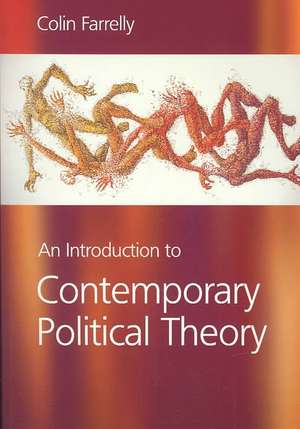Introduction to Contemporary Political Theory
Autor Colin Farrellyen Limba Engleză Paperback – 2 dec 2003
This comprehensive textbook provides a complete and accessible introduction to the main theorists and issues in contemporary political theory today.
The text is organized into two major parts. The first, Contemporary Liberal Theory, outlines four distinct liberal theories of justice to introduce the work of Rawls, Nozick, Gauthier and Dworkin. The second, Alternative Traditions, introduces the theorists and themes associated with four key areas of contemporary debate: communitarianism, multiculturalism, deliberative democracy and feminism.
By giving students questions for consideration and using applied examples throughout, the text illustrates the practical relevance of contemporary theoretical debates to everyday issues in policy and politics.
The result is an essential overview of all the main traditions, issues and positions in political theory today that will serve as an invaluable resource for all students of contemporary political theory, political ideas and political philosophy.
Colin Farrelly is Assistant Professor in the Department of Political Science at the University of Waterloo, Canada. Introduction to Contemporary Political Theory will complement Contemporary Political Theory: A Reader edited by Colin Farrelly and also published by SAGE Publications.
Preț: 524.38 lei
Preț vechi: 681.01 lei
-23% Nou
Puncte Express: 787
Preț estimativ în valută:
100.34€ • 104.98$ • 83.35£
100.34€ • 104.98$ • 83.35£
Carte tipărită la comandă
Livrare economică 03-17 aprilie
Preluare comenzi: 021 569.72.76
Specificații
ISBN-13: 9780761949084
ISBN-10: 0761949089
Pagini: 189
Ilustrații: black & white illustrations
Dimensiuni: 170 x 242 x 15 mm
Greutate: 0.45 kg
Ediția:First Edition
Editura: SAGE Publications
Colecția Sage Publications Ltd
Locul publicării:London, United Kingdom
ISBN-10: 0761949089
Pagini: 189
Ilustrații: black & white illustrations
Dimensiuni: 170 x 242 x 15 mm
Greutate: 0.45 kg
Ediția:First Edition
Editura: SAGE Publications
Colecția Sage Publications Ltd
Locul publicării:London, United Kingdom
Recenzii
This book gives an admirably lucid and careful account of the central controversies and sites of disagreement in political theory over the last thirty years; it does not sacrifice theoretical sophistication and nuance for the sake of clarity and accessibility, but rather achieves both. The book provides an up to date account of how things stand currently in political philosophy, and will provide an excellent introduction for students from any background. Reading this book will also greatly benefit anyone interested in how the most important contemporary political philosophers and theorists have approached the question of how we ought to live together.
Dr Catriona McKinnon, Lecturer in Political Philosophy, University of York.
Colin Farrelly has gathered together in one volume several of the key texts that have shaped recent developments in political
theory. The editor's introductions to each section make the readings themselves more accessible to students who are new
to the subject by locating them in a broader context. They also also provide helfpul outlines of some of the other major
theoretical contributions to the schools of thought that are covered. The structure of the book refelcts that of many courses
offering surveys of recent debates between liberals and their critics. It is an excellent teaching resource.
Shane O'Neill, Professor of Political Theory (and Head of the School of Politics and International Studies), Queen's University, Belfast.
Colin Farrelly has gathered together in one volume several of the key texts that have shaped recent developments in political
theory. The editor's introductions to each section make the readings themselves more accessible to students who are new
to the subject by locating them in a broader context. They also also provide helfpul outlines of some of the other major
theoretical contributions to the schools of thought that are covered. The structure of the book refelcts that of many courses
offering surveys of recent debates between liberals and their critics. It is an excellent teaching resource.
Shane O'Neill, Professor of Political Theory (and Head of the School of Politics and International Studies), Queen's University, Belfast.
Cuprins
PART ONE: CONTEMPORARY LIBERAL THEORY
Rawls and Justice as Fairness
Introduction
The Original Position
Equal Opportunity
Cohen's Egalitarian Critique
The Principles that Apply to Individuals
Who are the Least Advantaged?
Beitz on Global Justice
A Political Conception of Justice
Nozick and the Entitlement Theory of Justice
Introduction
The State: Is it Necessary?
Wilt Chamberlain and the Entitlement Theory
The Principle of Initial Acquisition
The Principle of Rectification
Conclusion: Self Ownership and Private Property
Gauthier and Justice as Mutual Advantage
Introduction
Hobbes and the State of Nature
Gauthier and the Compliance Problem
What is a Rational Bargain?
The Limits of Justice as Mutual Advantage
Dworkin on Equality
Introduction
Dworkin on Equality of Resources
Welfare Reform and the Basic Income Proposal
Political Equality and Democracy
Against Luck Egalitarianism
PART TWO: ALTERNATIVE TRADITIONS
Communitarianism
Introduction
Deontological Liberalism and the Unencumbered Self
State Neutrality
Walzer on Complex Equality
Miller on Nationalism
Conclusion
Multiculturalism
Introduction: The Politics of Recognition
Kymlicka and the Rights of National Minorities
Polyethnic Rights
Barry Against Multiculturalism
Deliberative Democracy
Introduction: The Importance of Democracy
Moving Beyond the Aggregated Model of Democracy
How Substantive are the Principles of Democracy
Retaining the Critical Edge of Deliberative Democracy
Critically Assessing the Ideal of Deliberative Democracy
Feminism
Introduction
Liberal Feminism
The Public/Private Dichotomy
The Politics of Difference
Conclusion
Rawls and Justice as Fairness
Introduction
The Original Position
Equal Opportunity
Cohen's Egalitarian Critique
The Principles that Apply to Individuals
Who are the Least Advantaged?
Beitz on Global Justice
A Political Conception of Justice
Nozick and the Entitlement Theory of Justice
Introduction
The State: Is it Necessary?
Wilt Chamberlain and the Entitlement Theory
The Principle of Initial Acquisition
The Principle of Rectification
Conclusion: Self Ownership and Private Property
Gauthier and Justice as Mutual Advantage
Introduction
Hobbes and the State of Nature
Gauthier and the Compliance Problem
What is a Rational Bargain?
The Limits of Justice as Mutual Advantage
Dworkin on Equality
Introduction
Dworkin on Equality of Resources
Welfare Reform and the Basic Income Proposal
Political Equality and Democracy
Against Luck Egalitarianism
PART TWO: ALTERNATIVE TRADITIONS
Communitarianism
Introduction
Deontological Liberalism and the Unencumbered Self
State Neutrality
Walzer on Complex Equality
Miller on Nationalism
Conclusion
Multiculturalism
Introduction: The Politics of Recognition
Kymlicka and the Rights of National Minorities
Polyethnic Rights
Barry Against Multiculturalism
Deliberative Democracy
Introduction: The Importance of Democracy
Moving Beyond the Aggregated Model of Democracy
How Substantive are the Principles of Democracy
Retaining the Critical Edge of Deliberative Democracy
Critically Assessing the Ideal of Deliberative Democracy
Feminism
Introduction
Liberal Feminism
The Public/Private Dichotomy
The Politics of Difference
Conclusion









